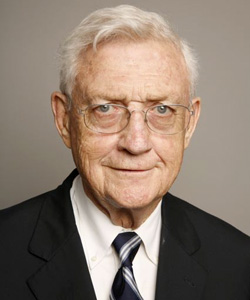 June 6, 2012 – President Barack Obama recently awarded the Medal of Freedom, the highest civilian award in the U.S., to State Bar of Wisconsin member and New Richmond native John Doar for his work as a civil rights lawyer for the federal government in the 1960s.
June 6, 2012 – President Barack Obama recently awarded the Medal of Freedom, the highest civilian award in the U.S., to State Bar of Wisconsin member and New Richmond native John Doar for his work as a civil rights lawyer for the federal government in the 1960s.
The award is annually presented to individuals who have made significant contributions to the nation’s interests. Doar, who served as a first assistant and assistant attorney general in the Civil Rights Division of the U.S. Department of Justice from 1960-68, joined 13 recipients of the Medal of Freedom on May 29 at the White House to receive the award.
Other recipients included singer-songwriter Bob Dylan, poet and writer Toni Morrison, former U.S. Secretary of State Madeleine Albright, and former U.S. Supreme Court Justice John Paul Stevens. “It was an absolute honor,” Doar said in a telephone interview from New York City.
“There could be no more privileged assignment than to work for the country in dealing with the very difficult and longstanding problem of race,” he said. “This award is really the collective work of the Civil Rights Division representing the United States in a very important matter.”
In his ceremonial address, President Obama said Doar “led federal efforts to defend equality and enforce civil rights” and recounted Doar’s courage during a tumultuous period:
It was a scorching hot day in 1963, and Mississippi was on the verge of a massacre. The funeral procession for Medgar Evers had just disbanded, and a group of marchers was throwing rocks at a line of equally defiant and heavily-armed policemen. And suddenly, a white man in shirtsleeves, hands raised, walked towards the protestors and talked them into going home peacefully. And that man was John Doar. He was the face of the Justice Department in the South. He was proof that the federal government was listening. And over the years, John escorted James Meredith to the University of Mississippi. He walked alongside the Selma-to-Montgomery March. He laid the groundwork for the Civil Rights Act of 1964 and the Voting Rights Act of 1965. In the words of John Lewis, “He gave [civil rights workers] a reason not to give up on those in power.” And he did it by never giving up on them. And I think it's fair to say that I might not be here had it not been for his work.
Doar Tapped to Enforce Voting Rights
After graduating from the University of California-Berkeley Boalt Hall School of Law in 1949, Doar was admitted to practice law in his native Wisconsin in 1950. He practiced law for 10 years at Doar Drill & Skow in New Richmond, a prominent Wisconsin firm his father helped build.
In 1960, Doar obtained a job as a lawyer for the U.S. Department of Justice, prosecuting voting rights cases during a critical time of the civil rights era. He became an aggressive civil rights advocate, participating in seminal cases and events throughout his eight years in that office.
“When I first took the job, I really had no idea just what the assignment would be,” Doar said. “The assistant attorney general said I would be working on voting matters, enforcing provisions of the 1957 and 1960 Civil Rights Acts. The substance of those laws involved voting rights.”
Doar said legal enforcement helped develop the facts that led to voting equality under the Voting Rights Act of 1965. “As a result of that, the world changed,” said Doar, who noted a great increase in the number of black citizens who registered to vote after the law’s passage.
“The countless individuals who were connected with this effort – primarily the black leaders, workers, and students with great courage during a dangerous time for them – deserve the credit of such an accomplishment,” Doar said. “The country broke a serious racial barrier.”
Doar left the Civil Rights Division in 1968, but not before leaving a footprint on the civil rights movement and other major events in American history.
He helped James Meredith become the first African American admitted to the University of Mississippi, and escorted him to the admissions office in 1962. He defused a potentially deadly riot in Mississippi in 1963, of which President Obama spoke at the awards ceremony.
He served as a chief prosecutor in a federal case against Klan-police conspirators in the killings of three voting rights workers in Mississippi, known as the “Mississippi Burning” trial.
In 1973, Doar served as special counsel to the U.S. House Judiciary Committee’s investigation of President Richard Nixon for the Watergate Scandal, which eventually led to Nixon’s impeachment and resignation.
He co-founded the New York City law firm of Doar Rieck Kaley & Mack in Manhattan, where he currently serves as senior counsel. Doar, who says he loves Wisconsin and the New Richmond area where he was raised, still visits the family home in New Richmond.
